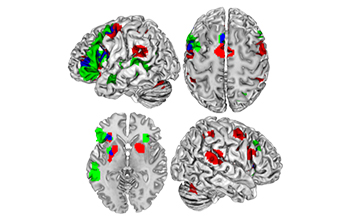News Release 18-076
New TRIPODS+X awards target Big Data solutions for broad range of research challenges
Projects will bring data science experts into collaborations with the broader research community

An fMRI image of the human brain showing when it is active in response to rhythm and grammar.
September 11, 2018
This material is available primarily for archival purposes. Telephone numbers or other contact information may be out of date; please see current contact information at media contacts.
Building on the success of its 2017 Transdisciplinary Research in Principles of Data Science (TRIPODS) awards, the National Science Foundation (NSF) is awarding $8.5 million in TRIPODS+X grants to expand the scope of the cross-disciplinary TRIPODS institutes into broader areas of science, engineering and mathematics.
In total, NSF will support 19 collaborative projects at 23 universities. The supported teams will bring new perspectives to bear on complex and entrenched data science problems.
"The multidisciplinary approach for addressing the increasing volume and complexity of data enabled through the TRIPODS+X projects will have a profound impact on the field of data science and its use," said Jim Kurose, NSF assistant director for Computer and Information Science and Engineering (CISE). "This impact will be sure to grow as data continues to drive scientific discovery and innovation."
The TRIPODS program's convergent and interdisciplinary approach emerged from the 2016 NSF TRIPODS workshop. The program has since evolved into a community of TRIPODS institutes that share expertise and work together to advance three NSF priorities central to TRIPODS:
- Research: Conduct cutting edge research in foundational data science.
- Visioning: Envision community-building efforts.
- Education: Train a workforce capable of meeting emerging data science challenges.
Each institute will use its award to expand efforts in one of these program tracks over the expected three years of each grant's duration.
Twelve research track projects will aim to develop new algorithms and fundamental approaches to data-driven challenges. For example, one project will attempt to create an end-to-end transit system for a city of 30,000 people, bridging bike-sharing with ride-sharing services and public transportation to improve the daily commute.
The three visioning track projects will focus on fostering collaboration across disciplines, helping spawn well-integrated research teams that yield truly new perspectives. One such project will explore machine learning to map complex processes in a wide range of applications in chemistry, chemical engineering, materials science, supply chain optimization, robot learning, sensing and cognitive neuroscience.
The four education track projects will launch pilot efforts to drive workforce development in multiple disciplines and at multiple education levels. Because comprehensive and inclusive research solutions for data science challenges require a diverse workforce, projects also address broadening participation. One project includes plans to engage faculty at minority-serving institutions to help them teach data science and develop related curricula.
"TRIPODS+X is exciting not only for its near-term impact addressing some of society's most important scientific challenges, but because of its potential for developing tools for future applications," said Anne Kinney, NSF assistant director for Mathematical and Physical Sciences (MPS).
The TRIPODS institutes align with Harnessing the Data Revolution, one of the 10 Big Ideas for Future NSF Investments, which aims to engage NSF's grantee community in the pursuit of fundamental research in data science and engineering; the development of a cohesive, federated, national-scale approach to research data infrastructure; and the development of a 21st-century data-capable workforce.
In addition to the CISE and MPS NSF directorates, the TRIPODS+X awards were also funded by the Directorate for Engineering, Directorate for Geosciences, Directorate for Social, Behavioral & Economic Sciences and the Directorate for Education and Human Resources.
Visit the NSF awards database for a complete list of TRIPODS+X grants.
-NSF-
-
An abstract model for matter helps reveal how materials change due to temperature or other effects.
Credit and Larger Version -
TRIPODS+X researchers meet with a Citi Bike employee as they study complex transit challenges.
Credit and Larger Version
Media Contacts
Joshua Chamot, NSF, 703-292-4489, email: jchamot@nsf.gov
The U.S. National Science Foundation propels the nation forward by advancing fundamental research in all fields of science and engineering. NSF supports research and people by providing facilities, instruments and funding to support their ingenuity and sustain the U.S. as a global leader in research and innovation. With a fiscal year 2023 budget of $9.5 billion, NSF funds reach all 50 states through grants to nearly 2,000 colleges, universities and institutions. Each year, NSF receives more than 40,000 competitive proposals and makes about 11,000 new awards. Those awards include support for cooperative research with industry, Arctic and Antarctic research and operations, and U.S. participation in international scientific efforts.
Connect with us online
NSF website: nsf.gov
NSF News: nsf.gov/news
For News Media: nsf.gov/news/newsroom
Statistics: nsf.gov/statistics/
Awards database: nsf.gov/awardsearch/
Follow us on social
Twitter: twitter.com/NSF
Facebook: facebook.com/US.NSF
Instagram: instagram.com/nsfgov


